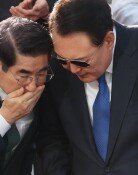EU, Japan react strongly against U.S. Inflation Reduction Act
EU, Japan react strongly against U.S. Inflation Reduction Act
Posted September. 06, 2022 08:06,
Updated September. 06, 2022 08:06
The European Union and Japan have also expressed concerns about the U.S. Inflation Reduction Act (IRA), which grants subsidies only to electric vehicles (EVs) manufactured in the U.S. European Commission Executive Vice President Valdis Dombrovskis recently pointed out that the act has a discriminatory nature against EV manufacturers in Europe to United States Trade Representative Katherine Tai. Japan is also allegedly raising concerns through various channels. The South Korean government is planning to continue the discussions with the U.S. through the visit of Trade Minister Ahn Deok-geun and Industry Minister Lee Chang-yang to the U.S.
Despite the backlash from its key allies, the U.S. is not likely to fix it any time soon. The IRA is the key legislation for President Biden’s presidential pledge, the ‘Build Back Better’ framework and is praised as a successful step to raise the approval ratings of the incumbent administration before the midterm elections. Even considering the reactions from the U.S., revisions to the act seem not to be in the cards. In the trilateral meeting with Korean and Japanese high-level national security officials last week, U.S. National Security Advisor Jake Sullivan said, “Let’s go back and take a detailed look at the act,” which is a demand to his counterparts to peruse the act, rather than a promise that he would take care of it.
Legislations in the U.S. aiming to boost the country’s competitiveness against China are increasingly exhibiting protectionist tendencies. The IRA introduces an already-operating rule that vehicles must have undergone ‘finally assembly’ within North America. to be qualified for subsidies and it also requires a percentage of the battery’s minerals and manufactured parts to be produced domestically. The Chips and Science Act, which was passed earlier, also includes a restriction that excludes American companies investing in China from the subsidy list. The act can put a significant barrier on Samsung Electronics and SK hynix’s projects in China.
These protective bills inevitably spark criticism that, after highlighting the solidarity with the allies and friendly nations to hold China in check, the Biden administration turned away from its allies to put its country first. Calling for the country’s enhanced competitiveness against China, the U.S. has been inducing domestic companies to restore their manufacturing and its allies’ companies to invest in the U.S. However, its ‘America First’ policy, which is not only in violation of international norms but also a betray to its allies, is now holding Korea up to ridicule, with the Chinese central media reporting an article headlined, “The U.S. stabbed Korea in the back.”
Korea has been focusing on strengthening its economic security alliance with the U.S., keeping pace with the U.S. strategies to restructure the supply chain. However, if companies that play a key role in the alliance get penalties from the U.S. and are forced to cut off their projects in China, the solidarity for the supply chain led by the U.S. can never be successful. The U.S. must be all ears about what its allies say and work hard to explore solutions.







